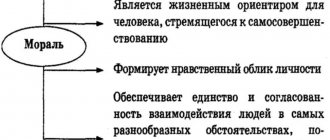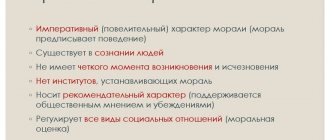Morality is a set of standards that allow people to live together in groups—what societies deem “right” and “acceptable.” Sometimes acting morally means that people must sacrifice their short-term interests for the good of society. Individuals who go against these standards may be considered immoral. But can we say that morality is the same for everyone, stable and unshakable? Let's understand the concept and see how morality changes over time.
Where does morality come from? Scientists have not yet agreed on this issue, but there are several most common theories:
- Freudian Morality and the Superego - Freud proposed that moral development occurs when a person's ability to ignore his or her egoistic needs is replaced by the values of important socializing agents (such as a person's parents).
- Piaget's Theory of Moral Development - Jean Piaget focused on the social-cognitive and socio-emotional perspectives of development and proposed that moral development occurs over time, at certain stages, when children learn to accept certain moral standards of behavior for their own sake, rather than simply complying with moral standards. norms because they don't want to get in trouble.
- Behavioral theory of B.F. Skinner - Skinner focused on the power of external influences that determine human development. For example, a child who receives praise for being kind may treat someone kindly again out of a desire to receive positive attention in the future.
- Kohlberg's Moral Reasoning - Lawrence Kohlberg proposed six stages of moral development that go beyond Piaget's theory. Kohlberg proposed that a series of questions could be used to determine an adult's stage of thinking.
When it comes to what triggers the development of morality, the dominant modern view on this issue is close to the position set forth by the 18th-century Scottish philosopher David Hume. He considered moral reason to be a "slave of the passions"
, and Hume's view is supported by research that suggests our judgments of right and wrong are influenced by emotional reactions such as sympathy and disgust. This view is consistent with the recent discovery that the elementary moral sense is universal and appears very early. Thus, infants as young as six months judge people by how they treat others, and one-year-old children exhibit spontaneous altruism.
Looking at the big picture, this means that we have little conscious control over our understanding of right and wrong
It is quite possible that in the future this theory will turn out to be erroneous due to the complete denial of reason. After all, emotional reactions by themselves cannot explain one of the most interesting aspects of human nature - the evolution of morality.
Values such as caring, compassion and safety, for example, are more important now than in the 1980s, the importance of respect for authority has fallen since the early 20th century, while judgments of right and wrong based on loyalty to country and family have steadily risen. increased. These results were obtained by the authors of a study published in PLOS One
, which showed distinctive trends in people's moral priorities between 1900 and 2007.
How we should understand these changes in moral sensibility is an interesting question. Morality itself is not a rigid or monolithic system; moral foundations theory, for example, posits as many as five moral rhetorics, each with its own set of virtues and vices:
- Morality based on purity, ideas of holiness and piety. When standards of purity are violated, the reaction is one of disgust and violators are considered unclean and tainted.
- A morality based on authority, valuing duty, respect and public order. Hates those who show disrespect and disobedience.
- A morality based on justice, which is opposed to a morality based on authority. Judges good and evil using the values of equality, impartiality and tolerance, and despises bias and prejudice.
- In-group morality that values loyalty to family, community, or nation and views those who threaten or undermine them as immoral.
- A harm-based morality that values caring, compassion, and safety and views wrongness in terms of suffering, mistreatment, and cruelty.
People of different ages, genders, backgrounds, and political beliefs use these types of morality to varying degrees. Cultures as a whole, over time, increase emphasis on some moral foundations and decrease emphasis on others.
CONCEPT OF MORALITY
What is morality? We know that society is not a simple aggregation of individuals, but an integral organism, a complex system of socio-economic, political and spiritual relations, the bearer of which is ultimately a person as a particle of large and small: groups, collectives, classes, nations. Man is an active being, and in his behavior he is guided by his needs and interests, beliefs and habits. And society is interested in ensuring that the needs and views of the individual do not contradict the interests of other people. One of the forms of coordination and regulation of these interests, different in content and social significance, is morality.
Signs of moral standards
- sustainability
Moral norms, represented, for example, in customs and traditions, can persist for a long time. Having originated in one century, they continue to be observed by several generations of people until they are replaced by other norms, but this process, as a rule, takes a long time. The second feature of morality follows from this.
TOP 4 articles
who are reading along with this
Morals and ethics
Spiritual culture of society
The spiritual sphere of society
What types of deviant behavior do sociologists identify?
- variability
Moral standards tend to change, since the social structure itself is subject to constant change. The emergence of new social groups is always associated with the formation of their own spiritual and material values, which do not always coincide with the values of the majority. The strengthening of the role of new layers of society leads to the fact that their values and norms are spreading more and more and becoming generally accepted.
What is morality?
Morality is a system of historically established requirements imposed by society on human behavior, loyalty to which is voluntary. Moral requirements express a model of human behavior approved by society, his attitude towards people, towards himself and towards the environment. It is enough to scroll through any news portal to understand how people around you live - https://tobolsk.ru/. Moral consciousness has also developed special concepts with the help of which human actions are justified or condemned: good and evil, justice and injustice, etc. Man has always been interested in the question: why is one behavior justified by society, while another is condemned? Why does a bad deed bring suffering to a person, but a good one brings joy, even when no one but himself knows about it? In search of answers to these and similar questions, people created a special field of knowledge - ethics.
Approaches to the Study of Morality
Naturalistic - comes from the complication of group feelings, ensures the survivability of the species in nature. Naturalists do not distinguish between the social and the biological; it is combined; there is no boundary between human and animal consciousness.
Religious-idealistic – God endowed humanity with morality.
Sociological - morality arises as a result of collective work activity and communication. The more complex social relationships, the higher the morality.
There are 3 moral foundations put forward:
- Traditions, customs and mores are the cultural characteristics of a particular ethnic group (people). With the help of socialization, the customs and norms of a given society are assimilated, which become a habit that shapes the personal side of a person. As a result, all actions will be of the nature of “this is how it is accepted” or “this is not accepted.”
- Public opinion is the regulation of norms of behavior through the approval or condemnation of other individuals in society. The reward for compliance with moral standards is honor, respect, recognition, and for violations - shame, isolation.
- Personal consciousness is the consistency of personal and social interests. Conscience is the main regulator of behavior. Morality appears to be a form of self-regulation, being selfless and personal. The choice of actions is characterized by voluntariness.
Moral consciousness is the ideal of moral behavior in a particular society, which does not go beyond the boundaries of the ethnic group.
Moral norm - has a formative effect on the moral beliefs of the individual: self-improvement, honesty, courage, struggle for truth.
A moral norm is options for a person’s everyday behavior: which actions are acceptable in society and which are not.
Imperativeness is a property of moral norms. Expresses the meaning of the norm, since in one case a prohibition is allowed, and in another, positivity is attributed. For example: “don’t lie.” A set of norms is determined by a moral code.
- In addition, the code includes value orientations:
- Characteristics of personality actions;
- The virtues of the individual, team, society;
- Characteristics of public institutions;
- Value concepts
- Categories of morality - good and evil, justice.
Motivation, assessment, self-esteem - a regulator of social behavior. Motive encourages moral activity in order to satisfy the needs of the individual. Motivation is a complex of motives responsible for the priority of an individual’s values and goals.
Moral assessment – gives a value assessment of an individual’s actions and behavior depending on existing norms and values in society.
Conscience is moral self-control, expressed in the formulation of rules of behavior, their implementation and evaluation of actions.
Debt is how an individual relates to society.
What is ethics?
Ethics is the science of the essence and content of morality, the laws of its emergence, development and functioning. Marxist ethics is an integral part of the ideology of the working class; it includes a theoretical understanding of morality. Marxist ethics for the first time determined the socio-economic source of morality, the patterns of its development and functioning. She pays special attention to the content of morality, expressed primarily in its requirements (principles, norms and rules), as well as the laws of its functioning - the fulfillment of a regulatory function, the process of transforming moral knowledge into beliefs and needs.
The study of ethics attracts a person’s attention to the moral side of his behavior, teaches him to see the moral aspect in any type of activity, helps him correctly solve his moral problems: to form an idea of the meaning of life and the moral ideal, to understand that morality is not established on its own, spontaneously, but requires a person’s activity in the struggle with himself, with the remnants of bourgeois morality in his consciousness and behavior, that he embodies morality” in practical affairs, in the fight against manifestations of evil and the affirmation of good. The study of ethics gives a person the opportunity to understand the entire system of moral relations in society and help him in organizing moral education and self-education.
Ethics is one of the popular sciences of the early 21st century
Even those who study it or face ethical problems in their activities are not sure that ethics is a science.
The contribution of science to people's lives is equated with their importance: the increasing speed of technological change increases the sense of importance of the natural and applied sciences behind them, while the effect of the discoveries of the humanities is less noticeable, some of them have not brought news for so long that they become synonymous with uselessness.
And ethics in a scientific context is also an irritant for many. If ethics were officially among the sciences, a crowd with torches would definitely come for it, demanding sacrifice as payment for Pluto.
The image of a crowd with torches, although metaphorical, is just as relevant in an era when people are busily discussing how best to organize a visit to Mars, as in the days when they were afraid to sail ships too far into the ocean, lest they be accidentally thrown over the edge of the Earth. washed away. Because the crowd has not gone away: instead of torches there are flashlights on smartphones, from which the crowd now gathers online.
And this is no less important an indicator of the dynamics of scientific development than Martian plans.
Accelerating technological progress shows the potential of the natural sciences, and stalling social and cultural development is the price of stagnation in the social and human sciences.
Ethical problems have always been part of objective reality, influencing it, leaving consequences and even economically expressible ones - money does not combine well with morality, and calculating the cost of ethical costs, for example, is quite realistic.
One of the most pressing examples right now is the policies that guide online mass communication platforms (primarily social networks and social media) in regulating the relationships among their users, with their users—and even the internal relationships within their teams.
The general state of affairs can be described as a deep split under the ideological monopoly of political correctness. The situation is like being stuck in quicksand, where every movement makes the situation worse - and begins to look hopeless; although she never was.
The problem of political correctness arose entirely due to the approach to the phenomenon of ethics as a political phenomenon. This is a problem of the erroneous language of description, and not the indescribability of the phenomenon itself.
What is political correctness
Political correctness is a secular system of ethics based on the protection of the weakest, the oppressed in the fight against inequality, which arose in the political movement of the New Left.
The New Left is a Western political movement for social justice that began in the late 1950s.
The New Left became an attempt to rebrand socialism, a term whose desired meaning had long been replaced by Stalinism, which had nothing in common with socialism, Marscoism, or the left idea in general.
At the end of the 50s, the first generation that did not experience the World War, at least at a conscious age, grew up among a huge number of other mothballed problems of society, the fight against which was destined to become the war of the post-war generation.
On the other hand, the consequences of Stalinism—including both the Soviet suppression of the Hungarian Uprising of 1956 and the condemnation of Stalin's personality cult at the 20th Congress of the CPSU that same year—pushed the New Left to return to the ethical roots of Marxism—the humanistic ideals of the 18th century. -19th centuries - and the relaunch of the leftist idea from a preserved version that preceded how “something went wrong” with the “old left”.
The New Left turned out to be an eclectic movement: it united activists who fought for civil and political rights, women's rights, against racial discrimination, against persecution for sexual orientation, police brutality, colonial wars, the beginning of the war on drugs, etc. These were the original Social Justice Warriors.
There was no unity among them either regarding the idea of class struggle or regarding Soviet symbols, although the hammer and sickle were, de facto, a symbol of Stalinism - that is, precisely a symbol of the replacement of socialism with its complete opposite.
It was a struggle against the dominance of the ethic of moral inequality, perpetuated by the hierarchical structure of society, the response to which was the mirror interpretation of the manifestation of any inequality as a form of oppression - the cornerstone of the ethic of political correctness.
Political correctness is the ethics of social struggle, the ethics of the New Left movement, developed in the course of a clash with the ethical system of their fathers and grandfathers.
This is ethics based on the moral values of the movement that carried out the sexual revolution in the 60s, defeating racism, homophobia, militarism, etc. in battle. This does not mean that in the 70s none of this already existed - it means that ethics, which was dominant in the 50s, had enough defenders on its side who were convinced of their moral correctness, in the 70s already have been marginalized - for example, the ideas of white supremacy continue to exist to this day - but their bearers do not risk openly claiming moral superiority or equivalence to the ideas of equality of people of all bloods and colors.
It's the difference between two positions fighting and closing the distance between them. Even when the front line that separated people disappears, the distance between them does not disappear on its own. But this is a post-war concern, requiring a value system that encourages cooperation and tolerance.
In these circumstances, the ethics of struggle—even for a just cause, for social justice—becomes destructive, because when viewed through the prism of political correctness, here it is, the front line, in place, and has not disappeared anywhere. As a result, the ethics of the side that wins in the struggle of value systems turns from an instrument of victory into an instrument of split.
In the absence of a real struggle for real ideals, scenarios in which the scenario of social conflict is reproduced become more and more absurd: political correctness already functions like a cancerous tumor, metastasizing in the form of new self-destructive conflicts.
In a movement that began with Stonewall, Rosa Parks, Martin Luther King, the very concept of a Social Justice Warrior is now self-parody, a derisive shorthand for SJW, and their front is tweets from the 2000s and photographs from the 1980s.
Political correctness in the 21st century
By all indications, by the turn of the millennium, political correctness was already beginning to fade away, but then a revolution happened - the best gift for every leftist - Web 2.0, the revolution of social networks, which unexpectedly turned out to be fertile ground for the renaissance of the ideology of political correctness, with new energy tearing the communication fabric with contradictions already in XXI century.
The dismissal of James Damore, an engineer and biologist by training, in 2021 by Google turned out to be a big scandal because in an analytical note compiled at the request of his colleagues, he mentioned the biologically determined difference in the psychological predisposition of people of different sexes to different types of activities - in other words , that women are a minority in software development, so the majority have found something more interesting to do.
In a similar situation, Twitter, and with it YouTube: bloggers are banned, videos are demonetized - and all this happens in a very nervous atmosphere, because for every user who agrees with what is happening, there are users who, not unreasonably, reproach the policies pursued by the services for various sins against common sense.
The Internet, which until recently was a space left to its own devices, largely organized by self-organization, suddenly turned into a battlefield between the Holy Inquisition and heretics, whom Google is almost literally trying to ban.
This reversal would be extremely dramatic if it weren’t so ironic: the creators of most social networks are rather antisocial people.
And Jack Dorsey, who invented Twitter, suddenly found himself in the situation of an acoustic engineer who designed the new stage of the Mariinsky Theater, who was suddenly announced that from now on he was giving two concerts a week, replacing Gergiev as a conductor.
How did he get into this situation? After all, for a long time, Twitter, like Facebook, like YouTube, and many other platforms felt great in the role of a platform, and interventions in the life of the community were, for the most part, limited to settling copyright claims.
In a sense, these were carefree pagan times, akin to the life of the inhabitants of the Caribbean islands before Columbus landed on their shores. In the face of political correctness, the anarchic space of eclectic pagan beliefs for the first time encountered the power of an organized ethical system.
How and when did morality arise?
Morality is the oldest form; human consciousness. Even the simplest primitive human collective could not do without morality. It was formed spontaneously, in the process of collective labor, which required the common efforts of people, because everyone’s life depended on the cohesion of the team, and everyone was forced to worry about his fellow tribesmen, without whom his personal existence and struggle with harsh nature would have been impossible.
Team unity required curbing the animal instincts of primitive man. The first moral norms developed in collective work (mutual assistance, obligatory work of everyone, loyalty to the commandments of ancestors) were woven into the life of people and played a large role in the formation of the primitive community. Everything was used to establish these customs: prohibition and public condemnation, physical punishment and even expulsion from the community. A person’s entire life took place in the sight of the collective, whose reaction to the behavior of the individual was of a practical nature, since the real position of the person in it depended on the collective.
Moral choice is responsibility. Moral choice (8th grade)
Moral standards provide an example of correct behavior. However, there is no reason to claim that a person always behaves correctly. He can be kind, generous, merciful, honest, noble, etc. But he is also capable of meanness, lies, betrayal, immeasurable cruelty, etc. Believers have a wonderful word for this case - sin. Everything that a person has done against morality, any evil, is a sin, they say. Instead of the program that is laid down by natural evolution, man is given freedom of choice in his actions - between good and evil, moral and immoral. This is a great gift that no other living creature possesses. A person himself always decides what to do: to observe or not to observe moral standards. When a person thinks about what choice he should make, this is a choice of action or, more precisely, a moral choice - when a person not only internally chooses his moral (good or evil) attitude, but also acts in accordance with his choice. We can say this: moral choice is the choice of one’s attitude (good or evil) towards other people.
Historical forms of morality
The process of moral development is complex and contradictory: progress in one direction may be associated with regression in another. Thus, F. Engels called the transition from a classless to a slave-owning society “a fall from the simple moral heights of the old tribal system.” Indeed, slave-owning communication gave rise to base moral feelings: greed, passion for pleasure, contempt for physical labor. Yet slavery gave rise to moral progress: as labor productivity increased, for the first time in history, man became valuable as a labor force.
The rejection of moral values is first carried out in practice. In ideology, the ruling class still continues to propagate its moral standards; therefore, hypocrisy is growing, the gap between the theory and practice of moral life, between what should and what is, between word and deed, is widening. However, progress is inexorable. In bourgeois conditions, the importance of proletarian morality begins to increase, which contains opportunities for more perfect regulation of relations between people. In its content and purpose, it is directed against bourgeois morality. Having emerged in bourgeois society, proletarian morality is enriched and developed under the influence of the revolutionary movement, and after the victory of the socialist revolution it becomes dominant.
Today in the world two moralities are opposed to each other: modern and bourgeois. These are antipodes. There is an uncompromising struggle between them. The moral progress of humanity is associated with the establishment of modern morality.
Freedom and responsibility (8th grade)
A person must always comprehend his actions, foresee their consequences - good or evil - and, of course, bear responsibility for the result. Because, even if we work hard and earn good money, but at the same time we do not think about the meaning of our activity, its social consequences, we can become a toy in the hands of evil and, willy-nilly, help commit crimes. Each of us, whether we want it or not, always bears responsibility for the social results of our actions. To be a responsible person means to correctly understand your own and other people’s problems and difficulties, try to foresee the results of your actions and be able to answer for them. There are different types of responsibility, but the most important one is moral responsibility , responsibility before one’s own conscience. Freedom is the ability to act at your own discretion . But if you have already made a choice, you will be responsible for your actions yourself. Because freedom and responsibility are like two sides of the same coin: one is impossible without the other. Freedom without responsibility is irresponsibility, it is arbitrariness, it is permissiveness, licentiousness. Irresponsibility is always associated with indifference and frivolity, with empty self-confidence. This is a blind, thoughtless, random choice, which often leads to harmful consequences, both for others and for the one who committed the irresponsible act. From this we can conclude that a person is always in a difficult situation. There has never been a ready answer, and there never will be. You have to decide for yourself what to do and take responsibility for your choice.
Features of modern morality
Modern morality is the highest level in the moral development of society. It has a number of advantages. As the morality of the revolutionary class itself, it is free from the illusions generated by class limitations. Its requirements coincide with the requirements of the objective laws of development and orient a person to promote progress. It is addressed to all workers, to those who are interested in the modern transformation of the world. This is the morality of active social action: the morality of fighting the old and establishing new forms of life. In modern morality, everything that was developed by the moral consciousness of previous generations, of all humanity, is comprehended and critically revalued. Modern morality was formed as the working class developed, its participation in the socialist revolution, in the construction of socialism. Its formation is a complex process that has gone through a number of stages. Today she is the morality of the builder of modernity.
The morality of a developed society has its own value system. It includes moral requirements that are different in content and form, in level of generalization and specific purpose - principles, norms and rules, customs and traditions. A special place among them is occupied by simple moral norms, which form the foundation of morality. The introduction of a person into the moral culture of society begins with the assimilation of the rich and varied content of these norms. Only on their basis can one master more complex norms.
Among the various values of spiritual culture, moral values occupy a special place. Society has always formed an idea about good and evil, about honest and dishonest, about fair and unfair forms of human behavior, about what is worthy of a person and what is worth devoting his life to, and what humiliates him and hinders him. These values of society help to distinguish, see and evaluate morality.
New in blogs
Evil and virtue are the central and basic concepts of moral consciousness. But moral consciousness is not limited to these concepts; they set its core. In many ways, the rest of the concepts of morality are formed around them and about them - good and vice, justice, duty, conscience, freedom. With the development of the content of these concepts, morality itself develops. The interpretation of the concepts of good and evil depends on how this process of moral development is understood. Their interpretation is the fundamental, basic system of perception of the world and society in human society
On the issue of the origin and development of morality, the most common are two approaches: religious, which elevates morality to the divine principle, and social, which considers morality as one of the social, sociocultural mechanisms that ensure the stability of society. In the first case, the concepts of good and evil are defined in their relation to God, in the second - to society. This does not mean that good and evil are necessarily understood differently in terms of content. Of course, when considering the source of morality in public life, good and evil can be made dependent on the interests of some social groups. But this means that good and evil are ideologized, morality is used to justify private public interest. More often, in the overwhelming majority of moral teachings, good is understood as that which promotes the good of everyone. The question remains open: where does a person’s desire to contribute to the good of others, to help and care, come from? Let's look at these approaches in more detail.
According to the first, most ancient idea, morality, like law, is given to man by deities or God. The law is given to people directly, by God himself or through intermediaries - heroes and prophets. Thus, the founder of Islam, the Prophet Muhammad, in divine revelation, found the truth and expressed it in the Koran. Jesus Christ, the God of Christians, proclaimed new laws of life in the Sermon on the Mount. In monotheistic religions, this is the only case when God openly appeared to people, lived and taught among them. But in Islam and Judaism, Jesus is recognized as a prophet, i.e. one of God's chosen people, and thereby the exclusivity of this case of personal transmission of the law by God to people is denied. Zarathustra (Greek Zoroaster, 7th–6th centuries BC), founder of the Iranian religion of Zoroastrianism and Moses (XIII–XII centuries BC), founder of Judaism - historical figures shrouded in myths and legends - prophets, through which Ahuramazda, the supreme god of the Zoroastrian pantheon and Yahweh, the Jewish God, conveyed their laws to people. If divine truths were revealed to Muhammad in meditation, and to Buddha (the founder of Buddhism) in a state of nirvana, then the gods personally appeared to Zoroaster and Moses.
The laws of Moses and the laws of Zoroaster have reached us almost completely, although, of course, not in their original form. From many indirect sources we can get an idea of other ancient, prehistoric normative codes.
All of them are more or less close, if not in content, then in general spirit, and are aimed at limiting tribal and clan egoism, individual arbitrariness, suppressing spontaneous cruelty and establishing customs and taboos that protect peace in the community. With the development of spiritual culture, changes in the instructions concerned the circle of people towards whom it was necessary to show peace and tolerance. Christ already called for universal forgiveness.
Another approach to the question of the origin of morality is that it is considered as an expression and development of natural tendencies, as an expression at a higher level of the same laws that develop during the process of evolution in the animal world. According to this naturalistic point of view, morality, by other means (social, cultural), solves the same problems that are solved thanks to biological mechanisms at lower stages of life development. Procreation, care for the weak and sick, mutual assistance, cooperation, solidarity, selflessness - all these traits are often found in the animal world, especially higher and “social” ones.
This point of view easily meets with sympathy and understanding among natural scientists and natural science-oriented social scientists, as well as among educated people. Although philosophers argue that moral judgments and decisions are mediated by reason, consciousness, and a sense of responsibility, in individual experience morality is given as if directly, it does not require reflection, special decisions, it seems to be known from the very beginning, almost from birth; it seems only dormant in a person and awakens at the right moment. Such everyday ideas about morality create the conditions for receptivity to biological theories, especially those supported by references to evolutionary genetics. However, at the same time, they fuel more and more attempts by biologists to explain morality from the standpoint of nature.
What fuels these ideas? Let us note two points. First: no matter how much one talks about the role of education in the formation of personality, the process of moral development of the individual remains elusive and, rather, even contradictory to the efforts made for the purpose of education, and at least largely independent of them. Second: in the behavior of animals, especially domestic, wild, living in communities, there are many phenomena and stable dependencies that are most easily “explained” from a moral point of view - as actions, as behavior, conditioned by living together, aimed at maintaining this togetherness. These impressions are generally accepted: it is no coincidence that assumptions about the natural basis of human behavior and morality in general have been expressed throughout the history of social thought, with the exception of those periods when the dominance of theological views was exceptional.
The evolutionary approach to ethics was formulated by the English philosopher Herbert Spencer. But the main ideas of this approach were expressed by the English biologist Charles Darwin, who specifically devoted two chapters of his fundamental work “The Descent of Man” to the problems of morality and its emergence. In them, the position about the natural, biological prerequisites of morality actually follows from evolutionary theory, based on extensive empirical material. It must be said frankly that Darwin did not discover new ethical ideas; in the actual ethical content of his concept of the origin of morality, he does not at all go beyond the boundaries set by such English thinkers as David Hume, Adam Smith and other philosophers of that circle. However, having adopted well-known ethical ideas, he gave them a natural scientific basis.
Darwin's main ideas regarding the conditions for the development and existence of morality can be reduced to the following provisions:
“Society exists thanks to the social instincts that animals (and humans) satisfy in the society of their own kind; From here flow both sympathy and services that are provided to neighbors. Darwin notes that services in animals never extend to all individuals of their species and are limited only to members of one community. »
“The social instinct is transformed into morality thanks to the high development of mental abilities; therefore, not only instincts, but also the images of all past actions arising on their basis play, so to speak, a controlling role, encouraging a person to actions aimed at maintaining a common (social) life, and preventing the dominance of any other instincts over social ones ."
“In humans, speech became the strongest factor in behavior, thanks to which it became possible to formulate the demands of public opinion (the demands of the community); but here, too, approval and disapproval of certain actions rests on sympathies directly determined by social instinct.”
“Habit plays an important role in every individual; social instinct and sympathy are strengthened by habit.”
In these four provisions, Darwin formulated the essential postulates of the biological approach to explaining the premises and origin of morality:
a) natural basis, b) high, compared to animals, development of the psyche and intellectual functions, c) the ability for articulate and developed speech, d) the reinforcing role of social mechanisms (which should include the ability to learn and reproduce).
In a modified form, modern biological theories of morality, based on the achievements of ethology (the science of animal behavior) and evolutionary genetics, accept all these postulates.
Let's look at some of these models.
Russian geneticist V.P. Efroimson, who spoke in 1971 with a famous article: “Pedigree of altruism (Ethics from the standpoint of human evolutionary genetics)” (1), cites this observation by ethologist E. Mare, who spent three years directly studying the life of baboons in Africa. Not far from the path along which a herd of baboons was moving towards their caves, a leopard lay down. The predator has been discovered. Two male baboons separated from the herd, quietly climbed onto the rock above the leopard and jumped down at once. One grabbed the leopard's throat, and the other grabbed the leopard's back. And although the leopard ripped open the belly of one with its hind paw and broke the back of another with its front paw, one of the baboons, a moment before death, managed to inflict a mortal wound on the leopard, biting through its jugular vein. The threat to the herd has been eliminated.
The behavior of baboons cannot be explained from the point of view of mutual altruism: having sacrificed their lives for the sake of their relatives, altruistic baboons can no longer - according to the principle of reciprocity - become the object of someone else's help.
It is impossible to interpret the behavior of baboons if we proceed from the classical evolutionary theory, according to which the mechanisms of adaptation of animals are focused on the survival of the individual. Classical evolutionary theory had its own socio-ethical consequences: the principle of individual fitness was supposed to lead to the establishment of egoism. The theory of individual fitness may explain help as an exchange of services, but it does not explain sacrificial help in animals. But the contradiction between the facts and the provisions of the theory was not hopeless - mutual assistance itself began to be considered as a factor of evolution.
We are talking about the fitness not of a group in general, but of a group of relatives. In other words, it is necessary to distinguish, as many evolutionists and ethologists insist, between group selection and kin selection. Thus, in the course of evolution, selection for altruism occurs: those groups survive whose individuals have a genetic structure that determines altruistic - helping, selfless, sacrificial - behavior.
The value of evolutionary and ethological programs and research results is beyond doubt. Numerous data from specific disciplines studying man confirm that it is not possible to understand man outside his nature, outside his biological characteristics. The significance of the results of scientific searches in line with evolutionary genetics and ethology lies in the fact that they allow us to see many similarities in the behavior of animals and humans and, therefore, take a fresh look at the specifics of human sociality. A person is not a tabula rasa (2), which is filled in in the process of public education - from the moment of his birth he is a bearer of specifically human biology, he is biologically prepared to assimilate the cultural and historical achievements of society. Moreover, the problem is not limited to the fact that nature is “humanized,” “socialized,” and filled with social and cultural content; this content itself, as biologists show, follows from a long process of evolutionary development.
However, all these themes and plots constitute the subject of anthropology, but not ethics. At the level of biological and ethological research of humans, morality cannot be comprehended. Here we can talk about forms of cooperation, cooperation, as well as competition and rivalry (to which for a long time researchers of animal behavior, striving to uncover the biological prerequisites of morality, did not pay due attention), but not about altruism, not about morality.
From the point of view of the evolutionary approach to morality, it appears in an extremely impoverished form: morality turns out to be reduced to adaptation and accommodation, altruism to cooperation, love to the developed biological need of any higher animal for affection. The evolutionary concept of altruism is quite specific: it is behavior, the only criterion for evaluation of which is the results, namely, the fitness of the individual or group; results that are achieved due to the individual who exhibits altruism. Evolutionists consider altruistic actions through which they help others in times of danger, help the weak (sick, wounded, children, old people), and transfer their food, their tools and knowledge to others. Moreover, any actions of this kind, regardless of motivation, are recognized as altruistic. Meanwhile, as we have seen, the historical development of the ethical thought of mankind has followed the path of clarifying the characteristic features of morality, moral decisions and actions. This is how the concept of altruism appeared, denoting not any relationship of help and productive interaction, including those motivated by pleasure and benefit, but behavior unselfishly oriented for the benefit of another person.
Morality can be explained in terms of adaptation theory. However, the content of morality is not limited to adaptability, and morality is not a special, much less the only form of adaptation. The ability to learn, for example, has much greater adaptive potential than altruism. Functional differentiation within the social groups of archaic society was also significant in adaptive terms, in particular, the allocation of special functions that, due to their experience and worldly wisdom, were performed by old people - priests, teachers, mentors. No less important and adaptively “capacious” were the abilities to make tools, both technical and logical, spiritual, and the ability to create, including social creativity. All this suggests that adaptability is not a specific feature of morality. In addition, homo sapiense, unlike all species known on Earth, is not an animal that adapts so much as it transforms its environment. It was the colossal development of creative activity aimed at transforming the living environment, creating a special material environment, creating a spiritual culture - this is what revealed the breakthrough thanks to which man became human. The emergence of human culture and the development of morality actually neutralized the importance of biological abilities to adapt.
Another view on the nature and source of morality is that morality is an exceptional social (socio-cultural) phenomenon that arises in the process of social development as a means of satisfying certain needs of society. This approach to morality can be called sociological.
The emergence of morality was historically predetermined and mediated by the decomposition of the primitive community in the process of isolation of economic life, social differentiation and the formation of the first state institutions. However, there is another point of view, according to which morality arises in the depths of the primitive and even early primitive community. The whole point is whether we understand by morality in general any norms that regulate relations between people (and such norms, indeed, are formed simultaneously with the formation of man and the transition of man from a state of savagery to barbarism) or special norms, the action of which is based on individual and independent choice and decision-making (and such methods of regulating behavior are formed relatively late, during the period of decomposition of the tribal community, during the transition from barbarism to civilization).
However, considering the emergence of morality as a stage in the formation of man and human society, it is important to understand what needs or goals of society and man morality meets. It is clear that its emergence was a consequence of the ineffectiveness of the existing mechanisms for regulating relations and resolving conflicts. But it is necessary to understand what underlies this innovation and whether the continuity of regulators is maintained.
In the era of the decomposition of the tribal system and the emergence of statehood (“the system of civilization”, “class society”), the life of society and the individual changes according to a number of parameters. There is a social differentiation of the primitive community, a gradual division of labor, individualization of human social existence, etc. With the dominance of the economic approach to understanding society and man, the division of labor is considered as the basis of all changes. Highlighting different moments in the process of transition from tribal society to the “system of civilization,” different authors essentially assume different images of morality: with an emphasis on social differentiation and the emergence of classes, morality comes closer to political ideology, while emphasizing the formation of cities (which at the dawn of ancient civilization as were usually city-states, policies) morality is moving closer to law. One can also assume a point of view according to which this turning point will be considered from the point of view of changes in the nature of the religious cult, namely, the transformation of some tribal cults into state cults with obvious subsequent privileges for the corresponding cults. Then morality comes closer to religion, and this rapprochement also has its own rational meaning.
It should be noted that already in the era of clan society, norms regulating relations between strangers and non-relatives developed. This is the experience of relations between different phratries, between representatives of different tribes and unions (leagues). The laws of Moses were precisely given to regulate relations between separate clans, the community of property in which was completely abolished and, on the contrary, the difference between personal and public was clearly established. It is characteristic that a set of rules is initially developed in relations between groups - clans, then tribes, and only during the period of differentiation of society and the transformation of clans into families is it transferred to relations between individuals.
From all of the above, we can conclude that morality is a transformed sense of the unity of the clan family, rooted in the depths of the evolutionary process, however, transformed at the moment of weakening of the instinctive norms of behavior determined by nature. Morality arose as a need to limit the egocentric impulses of man, which became aggravated during his evolutionary process. Moral standards are not instilled in us from birth, but are given by society as special personality qualities. This quality of human existence in the world is given with difficulty and is never given once and for all. Every person, to the extent that he recognizes for himself the highest criterion of perfection and accepts it as a practical principle, must affirm this quality of his life in every decision and in every action. This is the only way that good is realized – in opposition to evil.










